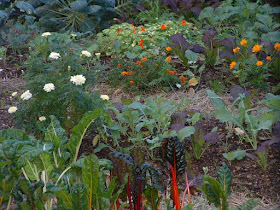The spring temperatures will soon be settled and it will be safe to plant your summer garden. If you have focused mostly on growing tomatoes, peppers and other favorite vegetables, consider adding some flowers to your garden. Not only will flowers add a splash of color and interest, but they can serve a significant role in providing nectar and pollen for pollinating insects, and attracting these insects will in turn help to pollinate your vegetables.
Colorado Master Gardener Volunteers gardening and blogging in Jefferson County Colorado. We work at the CSU Extension Office at the Jefferson County Fairgrounds. Call 303-271-6620 or e-mail your questions to mastergardener@jeffco.us
Pages
▼
Thursday, May 25, 2017
Thursday, May 18, 2017
Transplanting Tomato Seedlings by Donna Duffy
With spring marching along, it’s almost time to plant your tomato seedlings. It’s always a challenge to figure out exactly when to put them in the ground - Colorado weather is fickle this time of year. Last week’s hail storm wiped out many early planted annuals and seedlings. Once you’ve decided to proceed, follow the steps outlined in “How to Grow Your Own Tomatoes, Part 2: Transplanting, by Brian Barth, Modern Farmer. You can access the article here. Be sure to check out the links to other articles on growing tomatoes.
Thursday, May 4, 2017
It's Time to Arm Yourself Against Yellow Jackets by Joyce D'Agostino
<
Anyone who has tried to have a picnic, work in their yard or go camping has likely encountered the Yellow Jacket. Here in Colorado, we encounter the Western Yellow Jacket, Vespula pennsylvanica, most often. Because they are yellow and black in color, people often mistake them for honeybees, but the Yellow Jacket is much larger and from the wasp family, and can make multiple painful stings when they attack.
 |
| Yellow Jacket in trap, photo by Joyce D'Agostino |
Anyone who has tried to have a picnic, work in their yard or go camping has likely encountered the Yellow Jacket. Here in Colorado, we encounter the Western Yellow Jacket, Vespula pennsylvanica, most often. Because they are yellow and black in color, people often mistake them for honeybees, but the Yellow Jacket is much larger and from the wasp family, and can make multiple painful stings when they attack.

